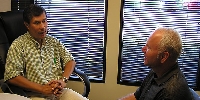A wide variety of alternative breast cancer treatments exist today. While “alternative” treatments are defined as practices that replace traditional treatments, most breast cancer patients use them in combination with conventional medicine. Generally, alternative treatments are not acknowledged by the medical community as standard medical practices and therefore, many patients do not inform their doctors when using these therapies. Examples of alternative treatments include acupuncture, massage, megavitamins, herbal supplements, nutrition, and magnetic therapy, to name a few.
Practiced for thousands of years, acupuncture involves the stimulation of specific points on the body using a hair-thin needle, or other method, to restore the body’s internal balance and energy flow. Acupuncture may be used for pain relief and to control side effects from chemotherapy.
Massage involves manual manipulation of muscles and soft tissue. It is believed that massage enhances the function of those muscles and tissues involved, while promoting relaxation. It is often used together with other therapies. Available scientific evidence does not support claims that massage slows or reverses the growth or spread of cancer.
Megavitamin treatments usually involve very high doses of vitamins A, C and E. While the body requires these and other vitamins for optimal health, too much of a single vitamin may be harmful and even interfere with other treatments. A healthy diet, one that offers lots of fruits and vegetables, eliminates the need for vitamin supplements. More is not always better.
Good nutrition is always important, but for anyone fighting breast cancer, or any cancer, it’s crucial. Though there are many, one alternative nutrition treatment is the macrobiotic diet. This diet is strictly vegetarian and includes whole grains, vegetables, beans, seaweed and soups. This diet is promoted for both cancer prevention and treatment, though there is no proof that is has any affect on either. In general, a healthy diet—one that includes fruits, vegetables and protein—provides the reserves of nutrients needed to maintain a strong immune system and cope with the adverse side of effects of treatments.
Herbal supplements are plant extracts and have long been used for a variety of health purposes. While they may be labeled as “natural,” it doesn’t mean that they are safe or even good for the body. The fact is that herbal supplements can act like a drug and may be harmful when taken in large amounts. There are few regulations in place to control the quality and safety of these products. In 2007, the FDA did initiate new regulations to help improve this, but many are not effective until 2010. Cancer experts often recommend that patients avoid dietary supplements altogether.
These are just a few of the many alternative breast cancer treatments available. When facing a life threatening illness, such as breast cancer, a feeling of desperation may be experienced while searching for treatments. As a result, the patient may develop an “I’ll try anything” mentality. While it’s important to keep an open mind about new treatment options, it’s more important to approach alternative treatments with caution. Be upfront and honest with everyone involved in treating your disease before starting any alternative therapies. Many of these may be safe, but there may also be risks involved when combining alternative and traditional medicine. Ultimately, the decision for any treatment is up to the patient. Choosing one treatment over another should be based on knowledge, not fear. Remember, knowledge is power.


